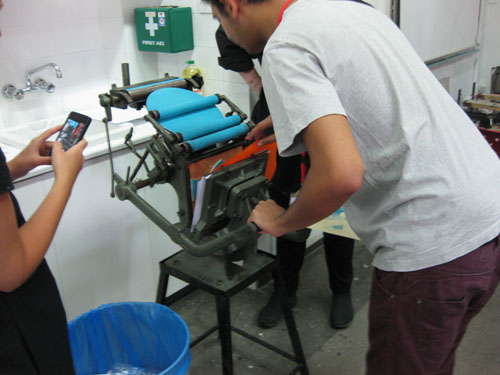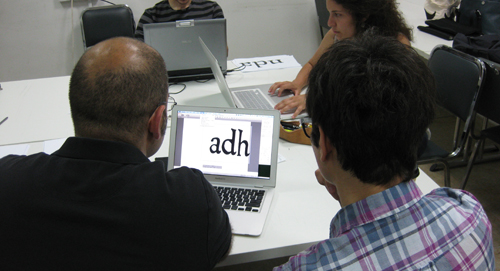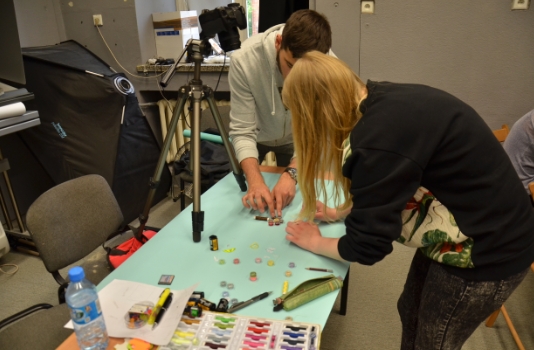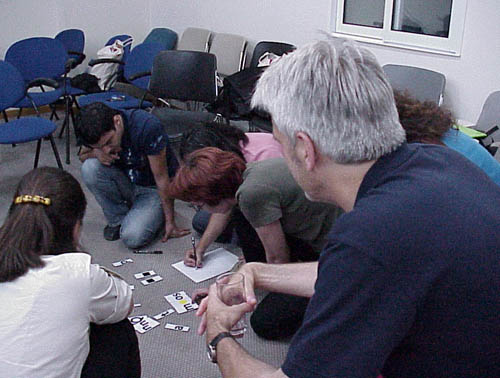Programme
Letterpress printing is a physical process that allows artists to experience letters as 3-dimensional objects. In this guided “letterpress–light” workshop, participants will “print” with raised laser-cut letterforms to create typographic experiments using stamping and rubbing techniques that mimic normal letterpress. Semi-transparent laser-cut paper letterforms and their counters in various colors will also be provided to workshop participants for additional experimentation by laying, cutting apart, and altering. This workshop will be completely experimental, allowing designers to push the boundaries of typographic form in new ways and in the process discover more expressive solutions to typographic problems.
ICTVC registered delegates only. You may select only one w/kshop.
Jeff Pulaski | USA
A life-long Kansan, Jeff Pulaski was born and raised in Newton, Kansas in the United States. He earned a Bachelor of Fine Arts degree from Wichita State University in 1990 and a Master of Fine Arts in Visual Communication from Kansas State University in 2008. He is currently an Assistant Professor of Graphic Design at Wichita State University. He is an active letterpress printer and collector. His letterpress collection has grown to weigh in at nearly 10 tons. It includes various platen and cylinder presses, a Prouty Power Press newspaper press, an 18'' Challenge paper cutter, a Model 31 Linotype and large assortment of metal and wooden type.
Joey Hannaford is an award-winning printmaker, graphic designer and lettering artist. She graduated from the University of Georgia with an MFA in Printmaking specializing in letterpress printing, book arts and papermaking. She is currently an Assistant Professor in the Department of Art at the University of West Georgia and has taught and conducted workshops in calligraphy, hand lettering and letterpress printing both nationally and internationally. Some of the collections that hold her work are HRH The Prince of Wales Architectural Trust, the Ronald Reagan and Jimmy Carter Presidential Libraries, and the Hargrett Rare Book and Manuscript Library in Athens, Georgia.
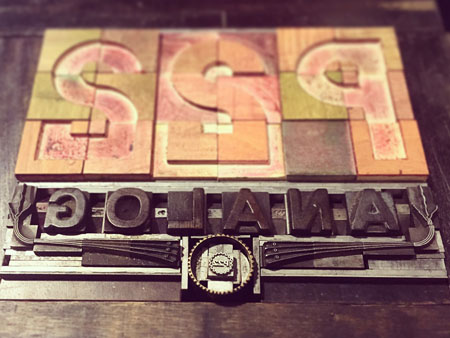
This hands-on workshop will use the newly created letterpress "P22 Blox" which uses only 8 basic shapes to create lettering and pattern design. Experiments with these letterpress blocks will allow students to learn the basics of letterpress and problem solving given strict limitations of material.
Richard Kegler is the founder of P22 Type Foundry and is currently the Director the Wells College Book Arts Center in Aurora, NY. As founder of the Western New York Book Arts Center, Mr. Kegler combined an interest in traditional crafts along with an entrepreneurial background to help create a self-sustaining community organization. His latest project P22 Analog focuses on pre-digital printing and typography.
ICTVC registered delegates only. You may select only one w/kshop.
Richard Kegler | USA
Richard Kegler is the founder of P22 Type Foundry and is currently the Director the Wells College Book Arts Center in Aurora, NY. As founder of the Western New York Book Arts Center, Mr. Kegler combined an interest in traditional crafts along with an entrepreneurial background to help create a self-sustaining community organization. His latest project P22 Analog focuses on pre-digital printing and typography.
This workshop is intended to get beginners off to a quick start in typeface design in the Latin script. The first day will build the correct foundations for sketching, developing ideas, and making decisions. The second day will cover working with outlines in Glyphs, spacing, and expanding a character set.
Gerry Leonidas teaches typography and typeface design at the University of Reading, UK. The rest of his time is taken with enterprise and knowledge transfer projects, and consultancy on publication design and typeface design. He is the director of the MA Typeface Design programme, and the TDi summer course.
Please, bring your laptops on the second day of the workshop.
The workshop is offered only in Greek.
ICTVC registered delegates only. You may select only one w/kshop.
Gerry Leonidas | UK
Gerry Leonidas is a Senior Lecturer in Typography at the University of Reading, UK. He teaches, supervises, and lectures on typography, typeface design, and typographic education. He writes on typeface design, and is often asked to evaluate bodies of work. The rest of his time is taken with enterprise and knowledge transfer projects. Gerry’s research interests cover the practice of typeface design as a response to wider contexts, and a range of issues surrounding Greek typeface design.
Generative design is a design process that works in imitation of nature and is able to produce endless series of unique visual outputs. Generative design is a fast method of exploring design possibilities, rapidly gaining ground, largely due to new programming environments such as Processing.
Starting with simple natural forms and basic physical phenomena we will move along a variety of creative territories to generate digital worlds. Unlike the usual design practice, not every aspect of the procedure is under control and this is exactly where the strength of this strategy lies: unexpected results, mimicking nature, despite the algorithm is always the same.
Besides learning the basics of coding, using the programming environment Processing, the workshop aims at navigating through a series of practical case studies on how to setup and control visual experiments through a designer oriented approach. By the end of the workshop, participants are expected to have the ability to design simple artworks using Processing. Moreover, attendees will learn systematic yet flexible approaches on exporting and managing massive, single or multiple page, pdf documents for further manipulation.
George Palamas, Creative Technologist
You'd need to bring your own laptop | PC (windows/linux), Mac
ICTVC registered delegates only. You may select only one w/kshop.
George Palamas | GREECE
George Palamas holds a Phd degree in artificial intelligence and bio-inspired robotics, from South Wales University. In 2010 he founded, with Panayiotis Palantas, the creative technology agency Artefact. Since then he has been working as a creative technologist, new media engineer and artist. He has collaborated with people from the entire spectrum of artistic and creative expression, building interactive environments and experiences. He worked for the institutes of Computer Science and Computational Mathematics, Foundation of Research and Technology (FORTH) and from 2004 until 2010 he lectured in the department of Applied Informatics & Multimedia, TEI of Crete, in robotics, microcontroller/arduino based systems and computer graphics.
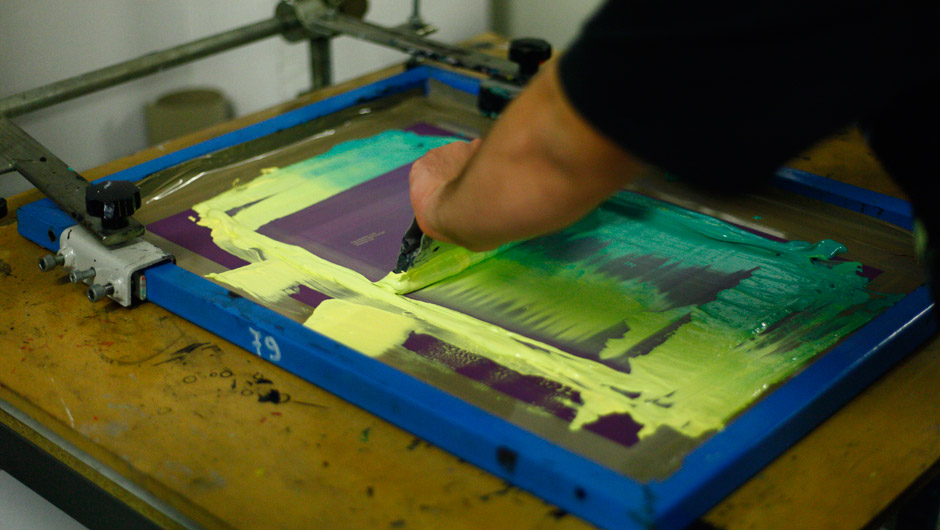
During the workshop we will work together to produce a collective
screen printed book. The process will mostly focus on hand made
techniques; from the initial design and page layout, to preparing
the screen and all the way to pull the squeegee and bind
the finished book.
Day 1: Presentation; Design and page layout; Printing
Day 2: Printing & Binding
Number of participants: 10
Previous screen printing experience is not necessary.
Please, remember to wear old clothes!
ICTVC registered delegates only. You may select only one w/kshop.
REPLICA | GREECE
When we aren’t designing or screen printing, we love to discover the beauty of the universe, get motivated by fascinated people, new ideas, sounds and images.
All these things give us the energy and enthusiasm to keep on designing and screen printing.
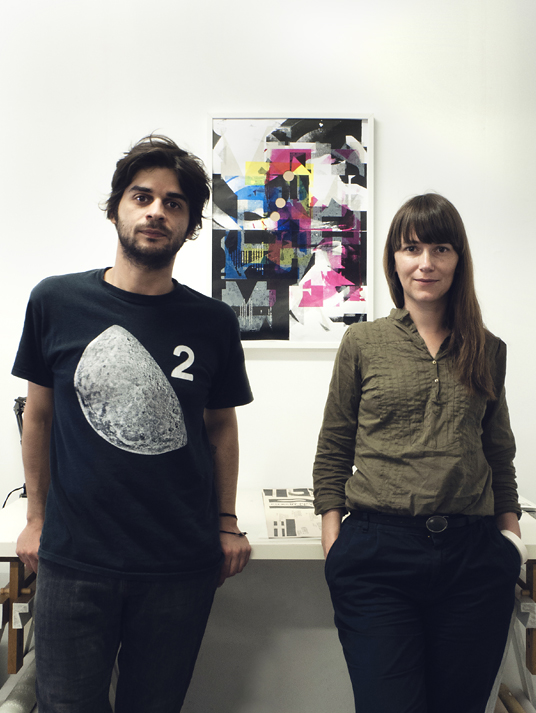

In this workshop we will set a solid foundation for the art of calligraphy through the study of tools, materials and techniques as well as the fundamental principles that govern the creation of hand made scripts/letters. We will be exploring the range of expression that tools, materials and scripts can give us to achieve a direction and better understanding of how we can use calligraphy in our work. Form will be the focus; the letters are beautiful things with great graphic potential in terms of pattern and texture. We will be looking at contemporary and historical work from around the world, but will focus on historical Greek letters from various periods.
Tools to be discussed include pencil, quill, reed pen, a variety of metal nibs, parallel pens, ruling pens and flat and pointed brushes. Our writing surfaces will include papyrus, parchment, and hot and cold watercolour paper. Mediums will be discussed and their preparation demonstrated from ink and ink sticks, gouache, mineral pigments and acrylic media.
ICTVC registered delegates only. You may select only one w/kshop.
Georgia Angelopoulos | CANADA
A teacher in the tradition of Edward Johnston and the Arts and Crafts Movement introduced Georgia to calligraphy in high school. Her family in Greece, strongly rooted in the arts, encouraged her to study Byzantine and Classical models for inspiration. She studied Art History in Greece and Victoria, BC, so her interest in the history of the calligraphic tradition is strong. She returned to calligraphy in 2005; although much of her work is in English, she is keen to connect to her Greek heritage – working at restoring the severely interrupted Greek calligraphic tradition and creating work that explores and bridges the richness of ‘cultural identity’.
Stop Motion Typography is a workshop that through the combination of typography with stop motion animation aims at the production of experimental and conceptual type animations. The workshop is suitable for both students and professional designers alike; participants will be guided through important steps in the creative process, focusing on brainstorming, collaboration, assessment of resources, visualisation, and production of results.
Through the reevaluation of everyday objects the workshop will build a bridge between three dimensional forms, typography and meaning.
Participants should bring at least 10 small everyday objects, a smartphone or camera and a tripod.
ICTVC registered delegates only.
Registration will commence 1hr before the scheduled workshop.
Barış Atiker | TURKEY
Barış Atiker is a motion designer and instructor living in Istanbul, Turkey. He has a Proficiency in Art degree on Motion Graphics Animation (2009) and he currently teaches Motion Typography, 2 and 3D Animation and Interaction Design at Beykent University. With over 10 years of design experience in leading and developing creative teams, he has worked for many award winning international branding, TV and Film Title projects. He is organising portfolio meetings for creative talents in Istanbul and also publishes a blog about motion design with tutorials and interviews with successful Turkish designers. Baris Atiker has ran several international workshops in Berlin, Dublin, Poland, and Turkey. Sample projects can be seen at:
www.facebook.com/groups/stopmotiontypography
This seminar/workshop will cover issues from both technical and legal perspectives, and the instructor can provide in-depth answers to real-world questions.
After completing the course, attendees will have learned the basics
of digital content licensing, as well as the finer points of the major open licenses, and they will be in a position to immediately apply the concepts learned into their daily work in order to minimize legal problems.
ICTVC registered delegates only.
Registration will commence 1hr before the scheduled workshop.
Alexios Zavras | GERMANY
Alexios Zavras, PhD, has more than 30 years experience in Free and Open Source software. He is a regular speaker on software and content licensing in international conferences. He is currently living and working in Munich and on the Internet.
In a simulation of the design practice participants are requested to design a solution for a customer. The journey to the final design leads them through a "maze" every designer has to go through: how to get the required information from the customer? Designers are forced to think about their way of working: to design their own design process.
The design game originally was made for the curriculum of the Royal Academy of Art in The Hague. Students for graphic design learn that not asking the right question or not thinking about the design process itself, never leads towards appropriate design. The design game create a small virtual world that hold all aspect of the real designers practice. Interested how your customer feels: play the game. Interested how your designer thinks: play the game.
Anyone can participate: designers, typographers, students, or non-designers. Fun for everyone!
Additional to the game Petr van Blokland will reflect on the game results in relation to the daily practice of a designer and to disciplines such as programming and artificial intelligence.
ICTVC registered delegates only.
Registration will commence 1hr before the scheduled workshop.
Petr van Blokland | THE NETHERLANDS
Petr van Blokland (1956) studied at the Graphic and Typographic Design Department of the Royal Academy of Visual Arts in The Hague, Netherlands. In 1979 he graduated cum laude and worked as an intern at Total Design in Amsterdam and Studio Dumbar in The Hague. From 1980 until today he was designer and partner in Buro Petr van Blokland + Claudia Mens in Delft, working on a wide variety of design projects, including corporate identities, typography, type design, programming and simulations of the design process. To specialize himself he studied for several years at the TU-Delft department Industrial Design. From 1984 until 1989 he taught at the Academy for Visual Arts in Arnhem. From 1988 until 2010 he is a teacher at the Graphic and Typographic Design Department, where he is still teaching the Master Type & Media of the Royal Academy of Visual Arts in The Hague. Since 2010 he lectures at the Master Graphic Design AKV St. Joost in Breda. As partner in webtype.com his focus is currently on designing type and the development of tools for type design.

